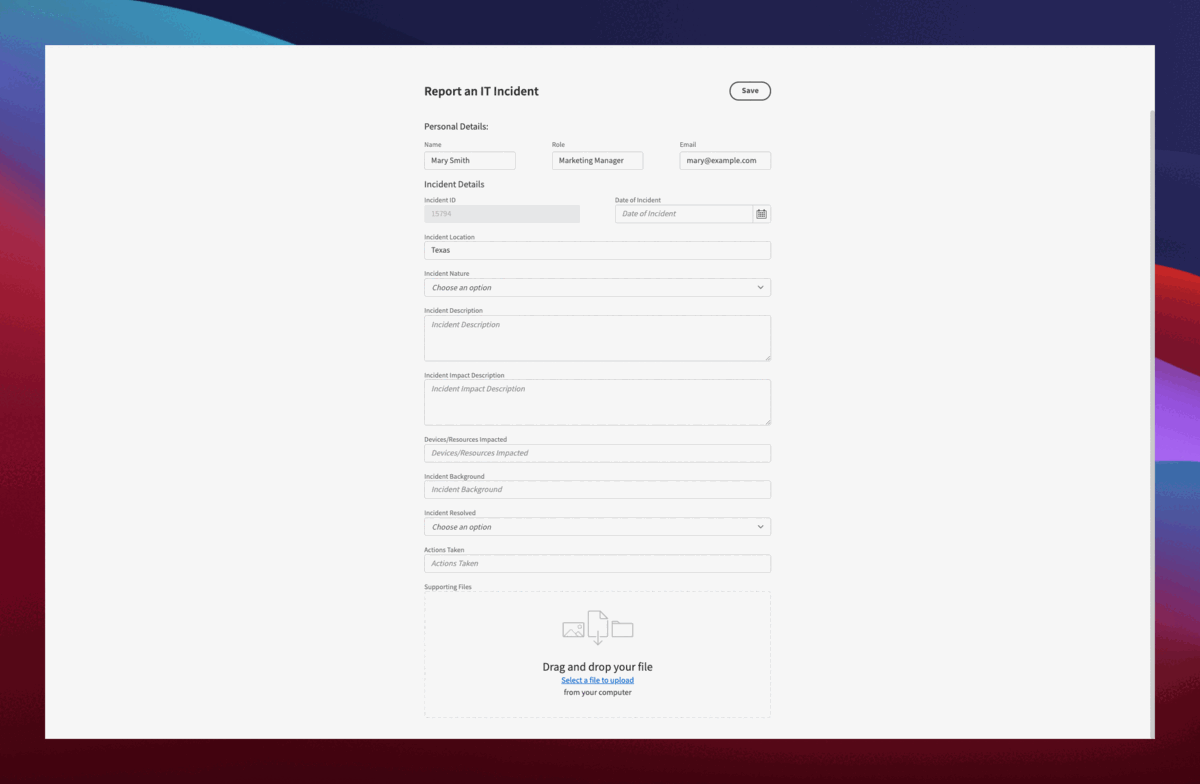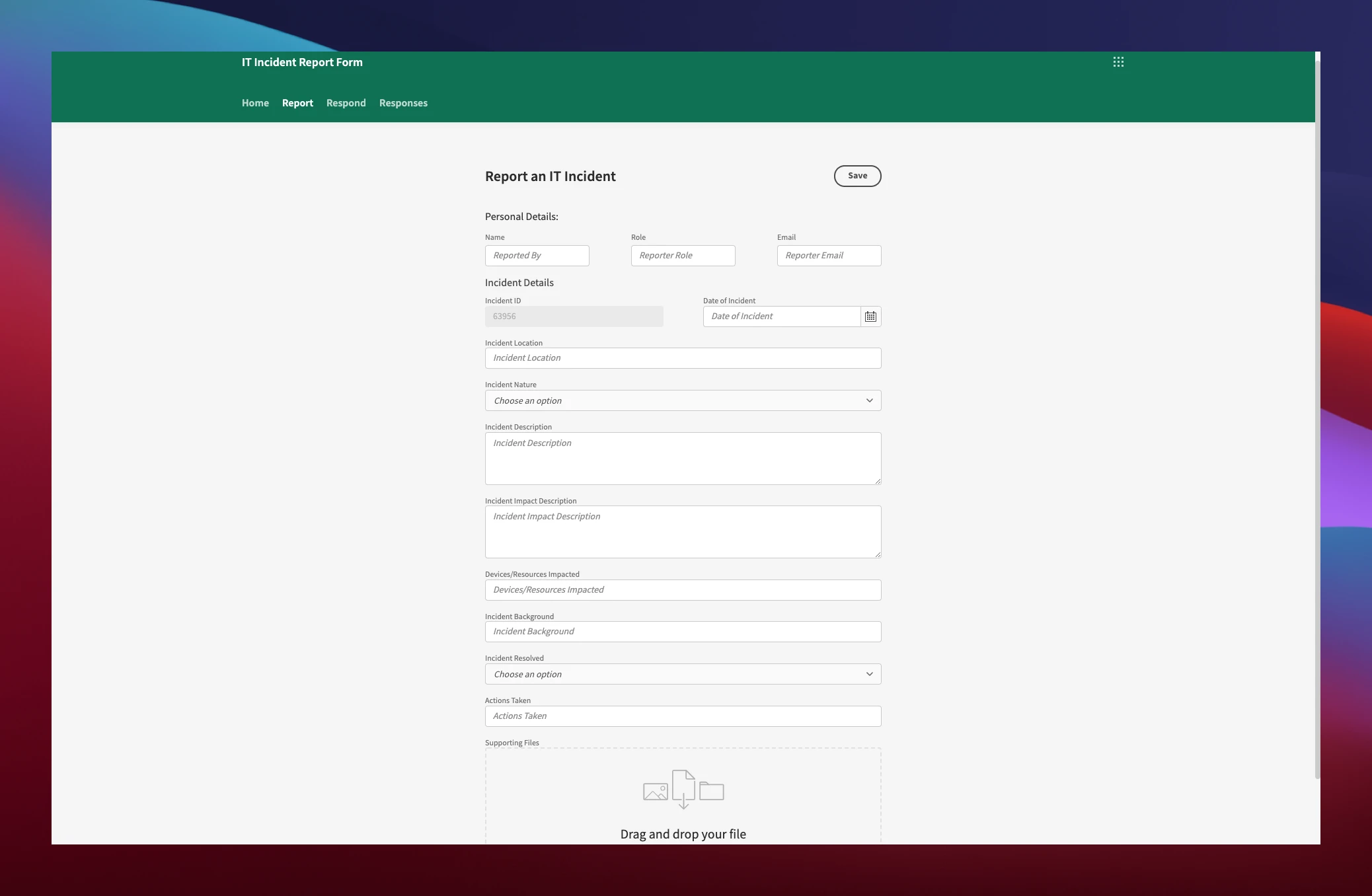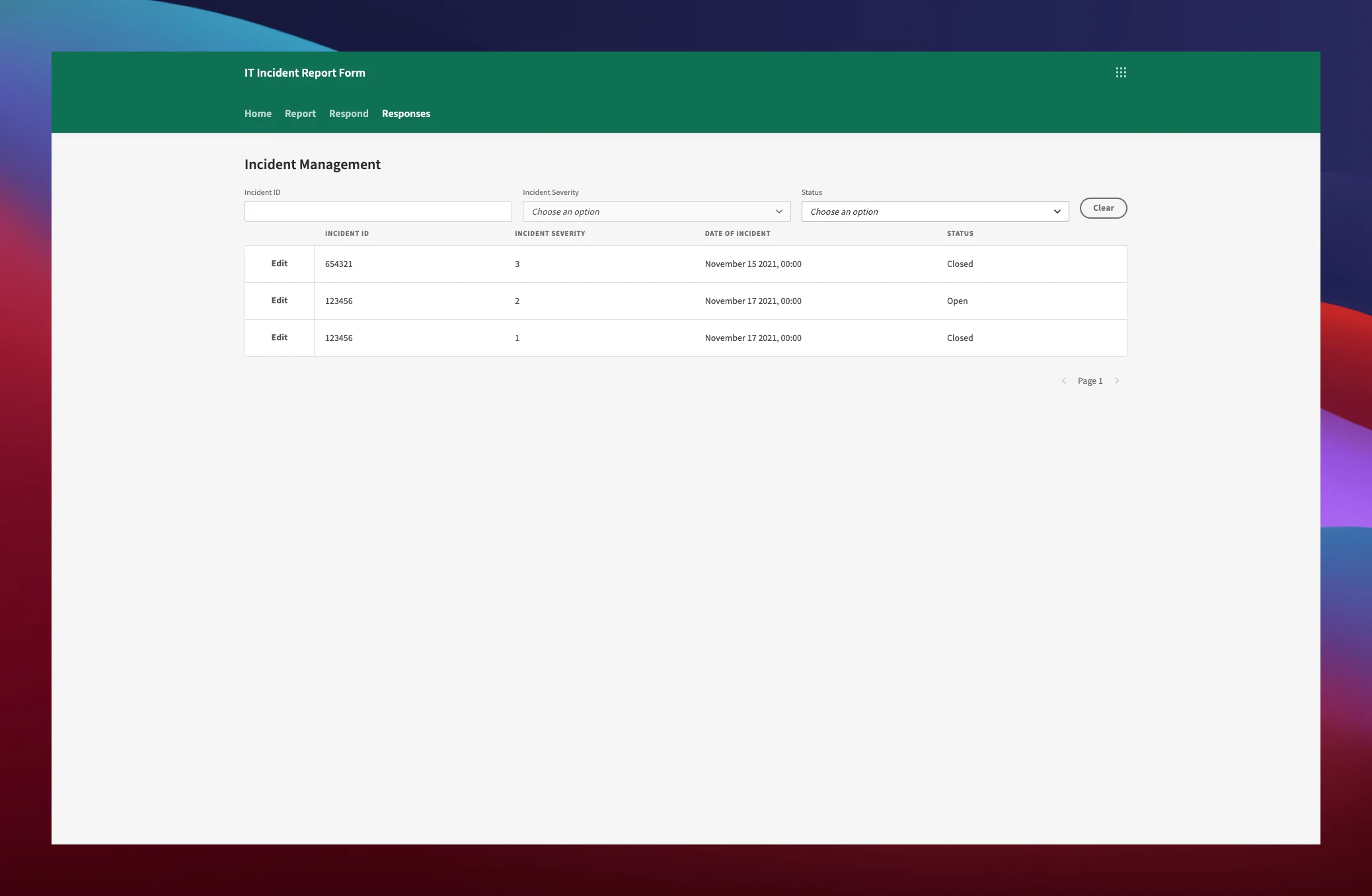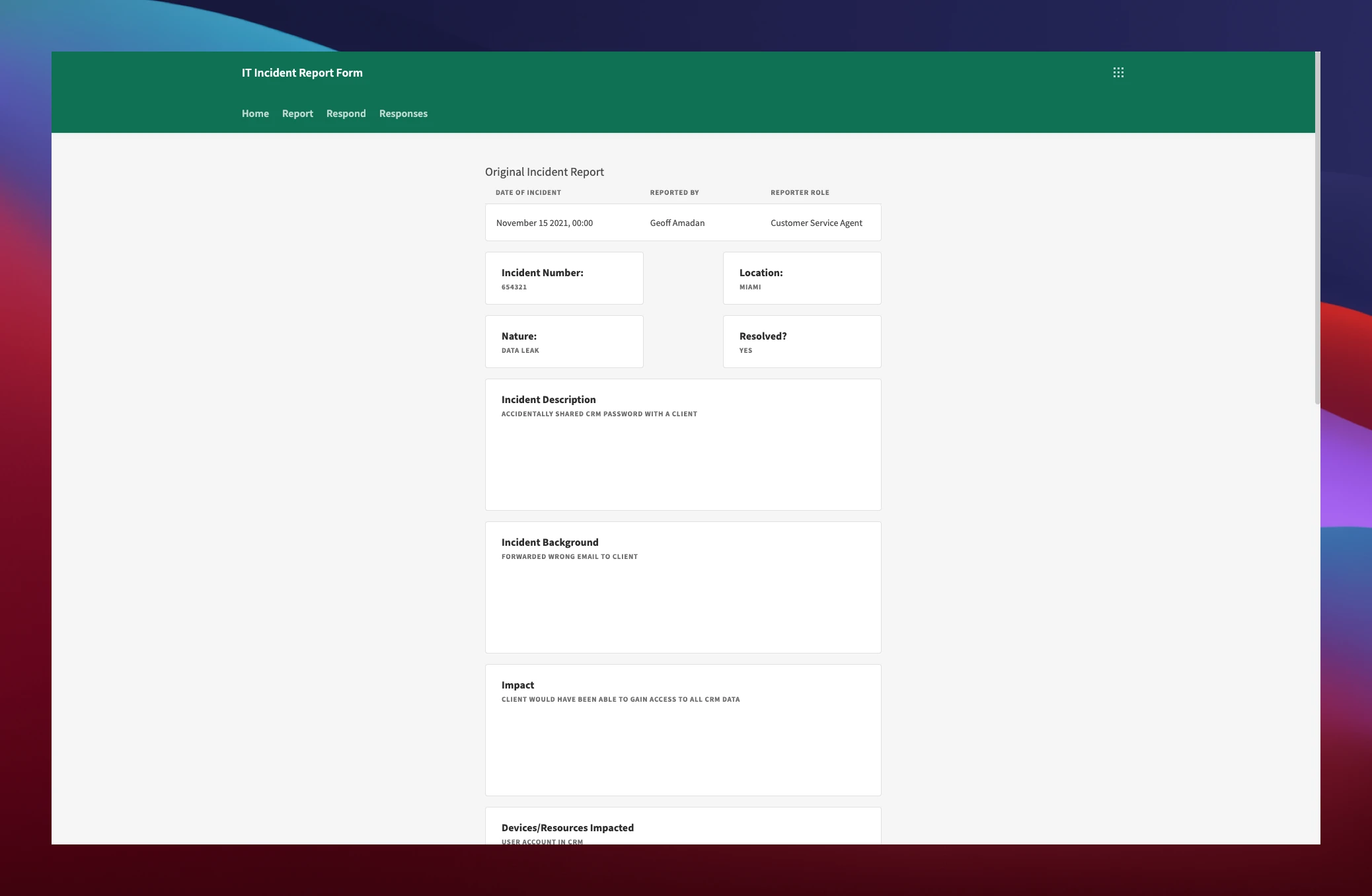
Cyber security is critical for modern businesses. Reporting IT incidents helps you to mitigate their impact, and prevent future issues. Even so, many businesses don’t have a reporting process in place.
With our incident report template, you can quickly build a platform to manage reporting. A central record of all IT incidents is the first step to securing your business. Our form is designed to maximize employee input.
What is an IT incident report form?
An IT incident report form is a simple tool for employees to record incidents. These can include cyberattacks, service disruption, or hardware issues. Effective incident report forms ensure quick, thorough, and consistent reporting.
Our incident report form template offers a quick and easy way for employees to record issues. Gain complete oversight over all IT incidents with our simple and intuitive form template.
Why do you need an IT incident report form?
Even with robust systems in place, things can go wrong. IT incidents often stem from human error, but they can result from many other causes. An incident report form is crucial to record, manage and prevent these issues.
Still, many businesses don’t have an incident reporting system in place. When incidents occur, employees then have to report them manually. This leads to most issues going unreported.
Our IT incident report template prevents this.
What should an IT incident report include?
IT incident reports are used to thoroughly record the details of an incident. This includes giving a chronological account of what happened, what the impact was, and trying to establish a cause.
Reports should also identify who or what was affected by the incident, and a corrective action plan.
When writing an incident report, most businesses follow a simple format. This includes descriptions and key details of incidents. With our simple incident report form, users can simply input key details to create a thorough record of the incident.
Our IT incident report template
Our IT incident report template uses a simple form to create an effective record, in seconds. Give your employees a quick and easy way to report IT incidents.
Out of the box, our template offers:
- Custom databases.
- Searchability.
- Automations.
- Intuitive UI.
- Access control.
- Custom data fields.
- Responsive design.
- Flexible hosting.
- Design customization.
- Streamlined processes.
Reporting and incident management
Incident reporting is crucial. Having a central record of all IT incidents helps you to identify threats, and prevent future damage. However, this only works if your employees actually report incidents.
Our IT incident report formats key information about the incident and affected systems in a clear, concise manner. When an incident occurs, any employee can note the required details in seconds.
We’ve also added an additional form, for IT workers to qualify and respond to incidents. On a separate record, your IT team can assign actions, incident severity, or escalate each case.

Customize report fields
Every organization is different. Your ICT incident report form must match the information you actually need. With a Budibase form, you have complete control over which data fields to include.
The Budibase builder makes it a breeze to add, edit, or remove form fields.
Our template is designed for quick deployment. We’ve provided the most common fields for effective incident reports. These include descriptive elements, as well as categorization fields and taxonomies. Users can even add supporting evidence and documents to help with formulating incident responses.
Automate workflows
Our ICT incident report template is built to simplify internal processes. When IT incidents occur, communication is key. The sooner your IT team receives your incident reports, the better.
With Budibase, any in-app action can trigger our vast library of automations.
Notify your IT team when a new incident is reported. With Budibase’s range of integrations, you can even trigger specific responses for different classes of incidents, including internal messaging, tracking tools, or even social media.
Check out our free maintenance request form template .
Organize and classify incidents
There is a wide range of different kinds of IT incidents. As such, it’s critical to accurately classify incidents, as they’re reported. Out of the box, our template offers data fields for incident categories and severity rates.
Optimize internal processes by classifying incidents based on required actions. Our template also includes data fields on incident resolution, giving oversight of which incidents still pose a threat.
With Budibase, you have complete control to organize and classify incidents as you see fit.

Streamline processes
Clear delegation is crucial when responding to IT incidents. The right team members must be assigned to respond to different incidents. This improves response times and internal learning.
Our IT incident report template helps to streamline processes.
Whether you want to divide incident categories into different workflows, or simply oversee responses, Budibase creates fast, effective internal processes.
Tailored permissions
Different teams use incident records differently. Most employees only need the ability to report incidents. IT teams must then be able to access, edit, and take action based on these initial reports.
Our template features four permission tiers. Basic users can access the initial form, and report incidents. Power and admin users can then view all reports, and access an additional form for responding to initial reports.
With Budibase, you have complete control to add and remove permission tiers as you see fit.

Design and usability
An incident report form is only as good as the information it gathers. We’ve designed our template for optimal data gathering. Our form offers an intuitive UX, with descriptive fields to prompt users to give the right information.
The goal is to maximize employee adoption.
Don’t bog your employees down with endless paperwork. Instead, give them a clean, usable form, which will encourage them to report IT incidents.
Conditionality
Our template offers conditionality based on user class, front-end data, and in-app actions. That way, you can offer a perfectly tailored user experience. For example, you might want to alter your form for different types of incidents.
You need different information for data breaches and service outages, for example.
With conditionality in Budibase, you can quickly transform simple forms into flexible and deployable data gathering apps.
Why build an IT incident report form with Budibase?
At Budibase, we’re building the world’s largest ecosystem of business tools. Our low-code builder offers:
- Open-source design.
- Scalability.
- Fast deployment.
- Access control.
- Flexible hosting.
- Responsive design.
- Security.
- Automation.
- Integrations.
- Free SSO.
- Multiple data sources.
- Infinite customization.
- Built-in JavaScript editor.
Free and open-source
Budibase is completely open-source. Unlike other low-code tools, we don’t charge hidden fees. Self-host, and enjoy unlimited users and apps.
You’ll even own the finished product.
We do offer premium support contracts and SLAs for enterprise clients. Our users are a community of passionate open-source app builders. Check out our pricing page for more details.
Security
Open-source means secure. Budibase works seamlessly with a wide range of data sources. Connect to existing databases, using CouchDB, Airtable, Postgresql, MySQL, and more. Budibase can be hosted on your own infrastructure, for maximum security.
Budibase apps also give you complete control over who accesses your platform. With fully customizable user permissions, you can give your users access to the exact information they need.
As a Budibase user, you’ll also enjoy free SSO across all of your apps.

Flexible hosting
Budibase offers complete flexibility for hosting your apps. Choose from self-hosting, managed infrastructure, or Budibase Cloud. Alongside our internal database, Budibase apps can be deployed on top of existing data sources.
Organizations love self-hosted Budibase tools for unrivaled security. We offer full support for Kubernetes, Docker, Digital Ocean, and more.
Integrate with your existing software stack
Budibase works perfectly alongside your existing software stack. Connect to existing data sets, or add additional functionality with our wide range of integration options .
Integrate your IT incident report form with third-party apps using Zapier, Webhooks, and more. That way, actions within our template can be used to trigger actions in your existing platforms.
Infinite scalability
Budibase is the top choice for organizations that need customizable, scalable internal tools. Your business is constantly exposed to new IT risks. Your IT incident report form must reflect this.
Add and edit data fields, or create additional processes to reflect a changing business environment.
Customization
As an open-source product, our IT incident report template is fully customizable. Use our simple low-code builder to add functionality, alter the design of your form, or apply branding.
Our simple and intuitive builder offers deployable business tools , in minutes.
Responsive design
Today, employees use a range of devices. Like all Budibase apps, our IT incident report template is fully mobile responsive. Create forms that look and function perfectly across all screens and devices.
Use Budibase’s built-in conditionality to display compressed or truncated forms to mobile users, creating a simplified user experience.
Powerful automations
Budibase offers a vast library of automations. Use any in-app action to query, update and manipulate data. Add functionality to digital forms , using our integration options, or built-in JavaScript editor.
With automated digital forms from Budibase, repetitive admin tasks can be eliminated, saving time and money.
Start using our IT incident report template
With Budibase, you can build deployable business tools in seconds. Click below to start using our IT incident report template today.
Deployment options
- Budibase Cloud Host with Budibase and let us manage everything for you. Quick and easy.
- Docker Self-manage Budibase using Docker and Docker Compose.
- Kubernetes Use the Budibase helm chart to deploy Budibase directly into your Kubernetes cluster.

- Digital Ocean The simplest way to self-host Budibase on your own infrastructure - 1 click install.

